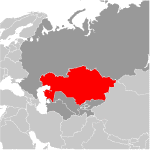| Republic of Kazakhstan Qazaqstan Respublikasy

Location central Asia
Bordered By Russia, China, Kyrgyzstan,
Uzbekistan, Turkmenistan

Area 1,052,090 sq mi
(2,724,900 sq km)
Highest Point Khan Tangiri Shyngy; 22,950 ft (6,995 m)
Lowest Point Vpadina Kaundy; -433
ft (-132 m)
Natural Resources petroleum,
natural gas, coal, iron ore, manganese, chrome ore,
nickel, cobalt, copper, molybdenum, lead, zinc, bauxite,
gold, uranium
Nationality
Kazakhstani
Population (July 2016 est) 18.360,353
Largest Cities Almaty, Karagandy,
Shymkent, Taraz, Astana, Pavlodar, Qyzylorda
Ethnic Groups Kazakh (Qazaq),
Russian, Uzbek, Ukrainian, Uighur, Tatar, German
Religions Muslim, Christian
Languages Kazakh, Russian
Capital Astana
Form of Government republic
Present Constitution Adopted January 28,
1993
Chief of State President
Nursultan Abishuly Nazarbayev (since
December 1, 1991)
Head of Government Prime Minister Bakytzhan
Sagintayev (since September 9, 2016)
Cabinet appointed by Prime Minister
Legislature bicameral Parliament
Judiciary Supreme Court of the Republic,
Constitutional Council
Local Administration 14 provinces (oblystar)
Currency Tenge
Per Capita Income $14,100
Industries oil, coal, iron ore,
manganese, chromite, lead, zinc, copper, titanium,
bauxite, gold, silver, phosphates, sulfur, uranium, iron
and steel; tractors and other agricultural machinery,
electric motors, construction materials
Agricultural Products grain (mostly
spring wheat and barley), potatoes, vegetables, melons;
livestock
Export Commodities oil and oil
products, natural gas, ferrous metals, chemicals,
machinery, grain, wool, meat, coal
Import Commodities machinery and
equipment, metal products, foodstuffs
Independence from the Soviet
Union Achieved December 16, 1991
National Holiday Independence Day; December 16
Flag a gold sun with 32 rays above a
soaring golden steppe eagle, both centered on a sky blue
background; the hoist side displays a national ornamental
pattern "koshkar-muiz" (the horns of the ram)
in gold; the blue color is of religious significance to
the Turkic peoples of the country, and so symbolizes
cultural and ethnic unity; it also represents the endless
sky as well as water; the sun, a source of life and
energy, exemplifies wealth and plenitude; the sun's rays
are shaped like grain, which is the basis of abundance
and prosperity; the eagle has appeared on the flags of
Kazakh tribes for centuries and represents freedom,
power, and the flight to the future

Latvia
Questions or comments about this
page?
|
 SKC Films Library
SKC Films Library
